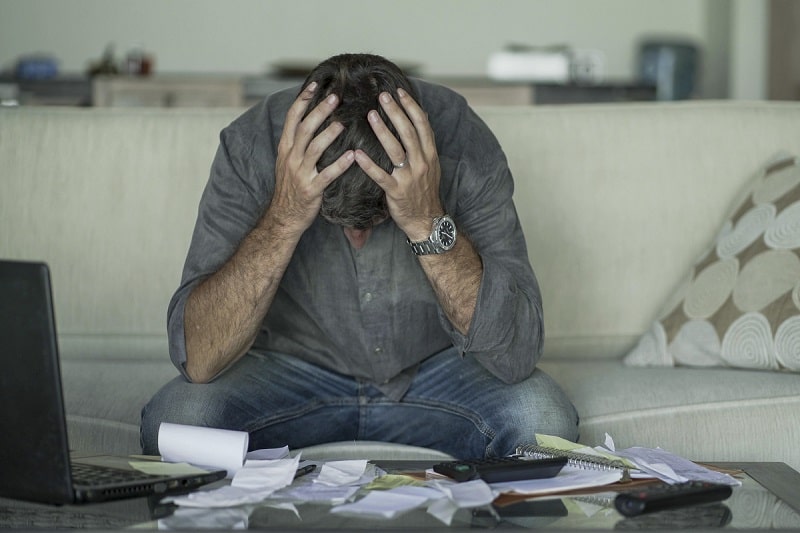Debt is never ideal, but admittedly, there is a big difference between a modest mortgage and a pile of high-interest credit card payments with mounting principal balances. Even with credit card debts, those who have a substantial income, a plan, and the means to pay the balance down before interest bumps up the overall amount due aren’t necessarily in a financial pickle, so to speak – even if it would be better for them to simply push that money into savings.
There are a few telltale signs that reveal you – or a friend – have crossed the threshold from less-than-ideal-but-manageable debt to problematic debt: in other words, debt that is unreasonably burdening you, sapping your savings, and creating massive problems for your future earning, borrowing, and saving potential.
Here are six signs that your debt has spiraled out of control.
#1: You’re Making Minimum Monthly Payments – And These Payments are Large
No matter your debt balance, you’re in trouble if you’re only managing minimum payments – especially if these payments are large due to high interest amounts. With mounting payment amounts that aren’t cutting down on the overall loan principal, you could set yourself up for a lifetime of paying down your debt without making any meaningful progress toward a debt-free life.
It’s vital that you pay down your balances so that the minimum required amount is a small portion of your income. If you can, try funneling 20% of your income into paying down your balances.
#2: Debt Collectors are Hounding You
Talk about stress! Harassing phone calls from collections agencies are just the cherry on top of an already harrowing financial situation. If collectors are calling you to threaten filing lawsuits or garnishing your wages, this is a sign that your debt has spiraled out of control.
Be cautious when you communicate with collectors, as you may unwittingly obligate yourself to pay a certain balance when you could otherwise reduce the amount down. Contact an attorney or credit counselor if you think you could benefit from some guidance.
#3: You’re Accepting Cash Advances
A cash advance is a dangerous way to use a credit card: Not only do lenders apply the most unfavorable terms to these types of transactions, but they also attach exorbitant one-time fees, as well as interest for unpaid balances. Resorting to these is a sign that your debt problem has intensified.
Instead of getting a cash advance (absent an actual emergency), try picking up a side hustle or extra shifts at work to supply the funds to pay down your debt.
#4: You’re Denied Additional Loans
Many lenders are happy to give you money, even if your credit history is bad – provided they profit through a high interest rate or by requesting collateral. But once you’ve been flat-out denied new loans, you’re clearly in hot water.
If you need to borrow additional loans (or hope to in the future), review your credit reports for any inaccurate information. Then, work hard to pay down your balances to decrease your debt-to-income ratio and to clean up your borrowing profile.
#5: You’re Draining Your Savings
Each month, you should put some money into savings – even if it is a small amount. Ideally, you should accrue between three and six months of living expenses (including both your fixed and flexible expenses) should an emergency arise. If there is simply no room in your monthly budget to save any money, you may find yourself in a pickle should you lose a job or face a medical emergency.
[ Read more about Tips for Budget ]
Start putting aside as little as three or five percent of your monthly income for your emergency fund. To do this, you will need to budget very aggressively and slash any and all nonessential expenses until you get your debt situation under control.
#6: You’ve Surpassed Your Credit Limit or been Declined a Transaction
If you’ve faced that embarrassing moment at the grocery checkout line when your card is declined, then you know your debt has become a problem. At this point, it’s time to stop using your cards, to examine your situation, and to take steps to pay down your balances before you build up new ones.
Once you’ve hit this point, the ideal is to stop using your cards altogether. Resort to the cash envelope approach, withdrawing the cash you need to pay your bills each month and only pulling from that stash. If you’re concerned that you’ll be tempted to keep swiping, ask a trusted friend to hold onto your cards for you until you resolve your debt situation.
While there are other warning signs signaling financial trouble, these six are specifically focused on a spiraling debt problem. If you’ve experienced even one of these situations, it’s vital to get your debt under control before it gets even worse.


